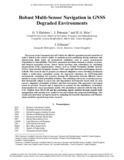JavaScript is disabled for your browser. Some features of this site may not work without it.
| dc.contributor.author | Villalobos Hernandez, Guillermo | |
| dc.contributor.author | Petrunin, Ivan | |
| dc.contributor.author | Shin, Hyo-Sang | |
| dc.contributor.author | Gilmour, J. | |
| dc.date.accessioned | 2023-03-05T13:51:40Z | |
| dc.date.available | 2023-03-05T13:51:40Z | |
| dc.date.issued | 2023-01-19 | |
| dc.identifier.citation | Villalobos Hernandez GE, Petrunin I, Shin H-S, Gilmour J. (2023) Robust multi-sensor navigation in GNSS degraded environments. In: AIAA SciTech Forum 2023, 23-27 January 2023, National Harbor, Maryland, USA. | en_UK |
| dc.identifier.uri | https://doi.org/10.2514/6.2023-2242 | |
| dc.identifier.uri | https://dspace.lib.cranfield.ac.uk/handle/1826/19261 | |
| dc.description.abstract | The success of an Unmanned Aircraft Vehicle for effective operation beyond visual line of sight is linked to the system’s ability to maintain precise positioning during stationary and maneuvering flight under all encountered conditions, such as sensor measurement degradation or unavailability. Therefore, unmanned operations demand a resilient, accurate, and integral navigation system. Sensor fusion increases data redundancy by combining measurements from complementary sensors, such as Global Navigation Satellite Systems GNSS, Visual Inertial Navigation Systems VINS, and Light Detection and Ranging Systems LIDAR. This research aims to propose an enhanced adaptative sensor switching mechanism within a multi-sensor navigation system for improved robustness in GNSS-degraded environments accounting for accuracy through the interaction between different sensor models by means of their probability of failure. The switching is driven by a real-time process that dynamically adapts to sensor loss and degradation environments based solely on each sensor’s adaptative probability of failure and their interaction. This approach is developed based on previous research and is improved to account for the dependency of heuristic determination for sensor uncertainty models. The simulation is achieved with the help of the UAV Toolbox from MATLAB and the positioning signals modeled through ground truth manipulation with existing error models to test and evaluate the proposed methodology. The results presented show an improvement by mitigating the heuristic dependency and Markov chain sensitivity reported in previous research. | en_UK |
| dc.language.iso | en | en_UK |
| dc.publisher | AIAA | en_UK |
| dc.rights | Attribution-NonCommercial 4.0 International | * |
| dc.rights.uri | http://creativecommons.org/licenses/by-nc/4.0/ | * |
| dc.title | Robust multi-sensor navigation in GNSS degraded environments | en_UK |
| dc.type | Conference paper | en_UK |
| dc.identifier.eisbn | 978-1-62410-699-6 |
Files in this item
The following license files are associated with this item:
This item appears in the following Collection(s)
-
Staff publications (SATM) [4365]

